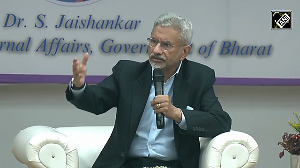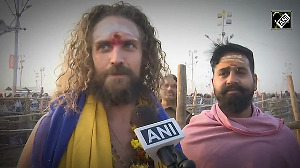In late June the United States declared that talks with the European Union over trading rules for Genetically Modified foods had broken down, and America would seek a formal World Trade Organisation panel investigation into the fairness of the European ban against such products.
The US insists that scientifically re-configured foods are perfectly safe, and the Europeans' opposition and scare-mongering over 'Frankenfoods' is simply a plot to stall American agri-businesses. Notwithstanding the Cartagena Protocol on Biosafety, which endorsed the go-slow approach, the US would seek a ruling to force open Europe's markets.
European opponents of cat's-tail corn and fish-spliced tomatoes have pointed to a possible compromise in the ongoing trans-Atlantic trade war. Why not simply label those foods that contain genetically altered materials, and let consumers choose which of these to accept or reject?
Indeed, some supermarkets in Europe carry a limited number of genetically altered products, labelled to show genetically altered origins. And early this month, the EU passed legislation permitting the sale of bio-engineered foods if they are properly labelled.
Under this standard, surely American agribusiness corporations could gain access to European markets without prolonged fisticuffs in Geneva -- right?
Wrong, as it turns out. First the United States argued that since so many foods now contain genetically altered material, it is impossible to know which products require labelling for modification. To this, the Europeans proposed that all foods that certainly include GM foods be labelled.
But here the American argument turned too clever by half. US trade negotiators insist that affixing labels on genetically modified products would subject American products to unfair competition, because consumers might assume that they are unsafe, even though they are perfectly edible.
Therefore, what is really needed is not only the removal of bans on altered foods, but in addition any labelling requirements must also be done away with!!
The audacity of this explanation is stunning. But to argue that customers are better off being uninformed isn't an idiot's argument; even a child can disprove that much. Instead, the insistence on clandestine sales is a calculated assault on representative government itself.
The essence of the American argument is that the buyer must not know which of the foods she consumes contain genetically modified material because if she did, she might change her buying behaviour to select GM-free foods. This is free trade from the Josef Stalin school of government and economics -- from leaders who already know what is good for their people, and treat their citizens' informed consent as an unnecessary irritant!
In my world, secrecy doesn't breed trust. I recall the Seven Dwarfs -- the heads of America's tobacco companies -- testifying in Congress that to their knowledge, tobacco was not an addictive substance, the evidence from their own science labs to the contrary.
I recall the Nike executives who insisted that the locations of their factories in Asia could be not disclosed to independent labour organisations because such information would hurt their competitiveness.
I recall representatives of our Parliament insisting that voters do not have the right to knowledge of their criminal backgrounds or financial dealings. I recall the assurances from our bureaucrats waving the flag for Monsanto -- who declared the Bt Cotton field trials in India were entirely satisfactory, but not open to scrutiny.
But in fact cigarettes do kill millions each year, and Nike did employ labourers in abominable conditions that eventually shamed even their own bean counters. And in fact, the list of criminals in legislatures around the country is a lengthy one. The Indian farmers who took the government at its word are now demanding compensation for their losses from biotech cotton.
And Enron was all gas, although not in the way its executives first claimed. In each case, it turned out that the secrecy was just a convenient cover for despicable conduct, and a necessary mechanism to thwart the public interest shamelessly. Rather than back their claims by subjecting them to independent scrutiny, the proponents simply shut citizens out completely.
And from this history of violated trust, I've come to the only conclusion that makes sense -- genetically modified foods are not safe, and the corporations that oppose labelling standards do so precisely for this reason.
When agri-businesses no longer seek to keep their research on genetic crops confidential, when they actually conduct multi-season field trials, when those trials are assessed by independent scientists, then the time to trust their claims of safety may arrive. But not yet.
This focus on transparency is an absolute must, because the global and national organisations that allegedly represent our interests have long since been compromised. The WTO arbitration panels that decide disputes such as the current one over labelling GM foods, for example, don't conduct their affairs in public.
Back home in India, the Genetic Engineering Approval Committee has turned into the handmaiden of agribusiness; rather than conduct independent appraisals it merely parrots the lines of the businesses themselves. No matter how advantageous the outcome of scrutiny by such entities, then, the process itself is too contaminated to hope that it can consistently promote the public good.
Skepticism is therefore the citizens' last defence against unethical or criminal conduct behind the closed doors.
Secrecy insults the intelligence of the citizen. Whatever our political leanings, we must not yield the public domain itself to political and commercial forces. 'Show-me' citizenship, in fact, serves quite well in most arguments for the public interest; it is a useful weapon to deploy against all kinds of vested interests in a plainly non-confrontational manner.
Interlinking rivers? Not a problem, provided it is public knowledge who conducted the feasibility studies, why none of the feasibility studies came back rated infeasible, who is bidding for the construction contracts, which lending institutions are involved, who will control the water supplies in local communities, how many people will be displaced, what will be their
compensation, and sundry other things.
Show me, and I can judge for myself how feasible it all is.
Fortunately, the very paradigm that now defeats the public interest contains within it the opportunity for redemption. Clandestine processes are defeated -- or at the very least, exposed -- simply by asking questions. A political process that depends hugely on the people's ignorance is hugely vulnerable at the hands of voters who seek information. By making our support or opposition to various policies conditional on public information, we can quickly raise the bar for accountable government.
Community groups around India are discovering this tool, and powerfully employing Right to Information laws to their advantage. RTI laws in some states, such as Delhi, provide for salaries to be deducted from state employees who provide false information; under such personal threat even conniving bureaucrats are quickly turned around.
The secret to democracy is less secrecy. Who? What? How? When? Interestingly, the answers matter only a little; it is in asking questions that we establish public dominion over lives and livelihoods.






 © 2025
© 2025